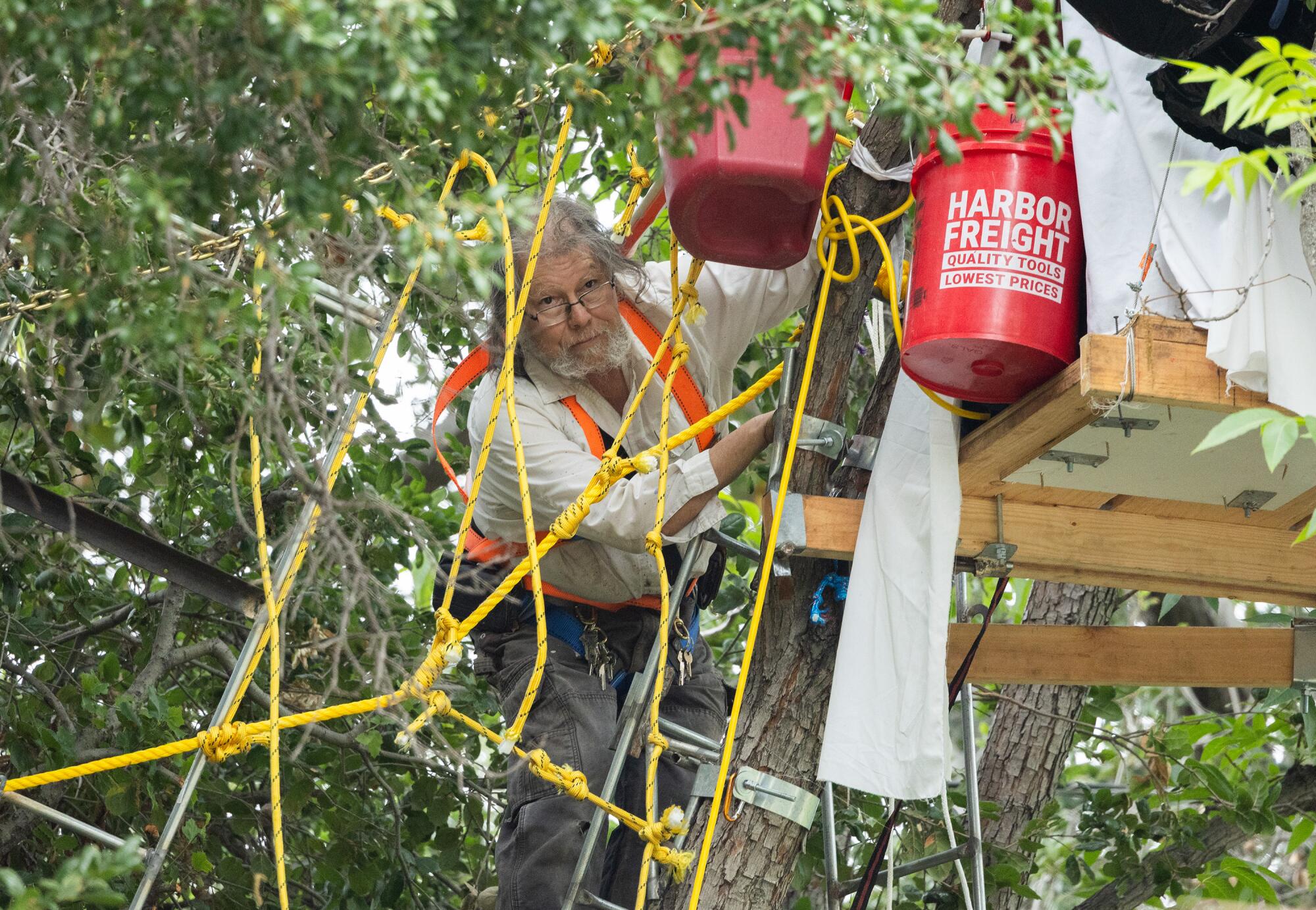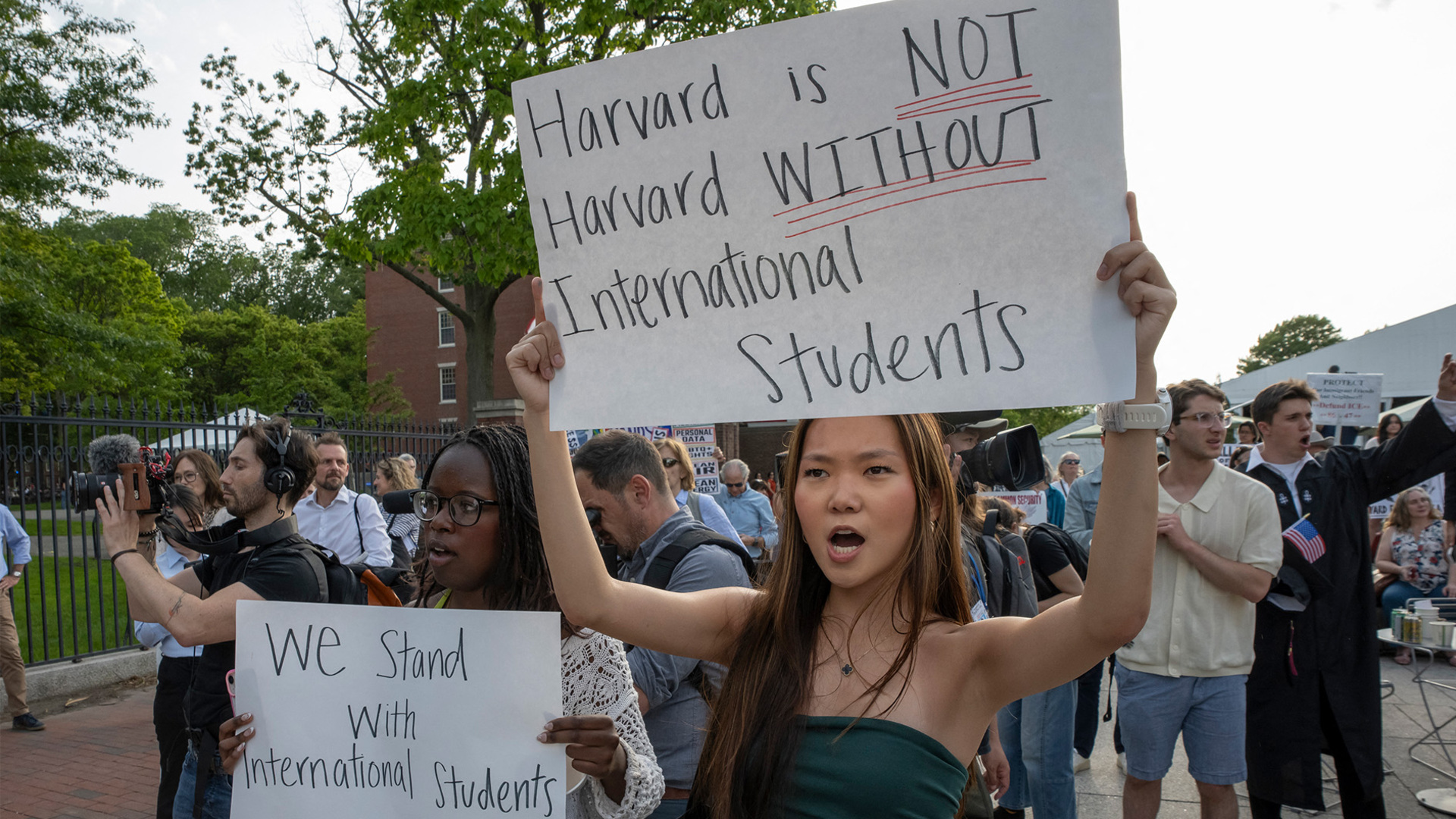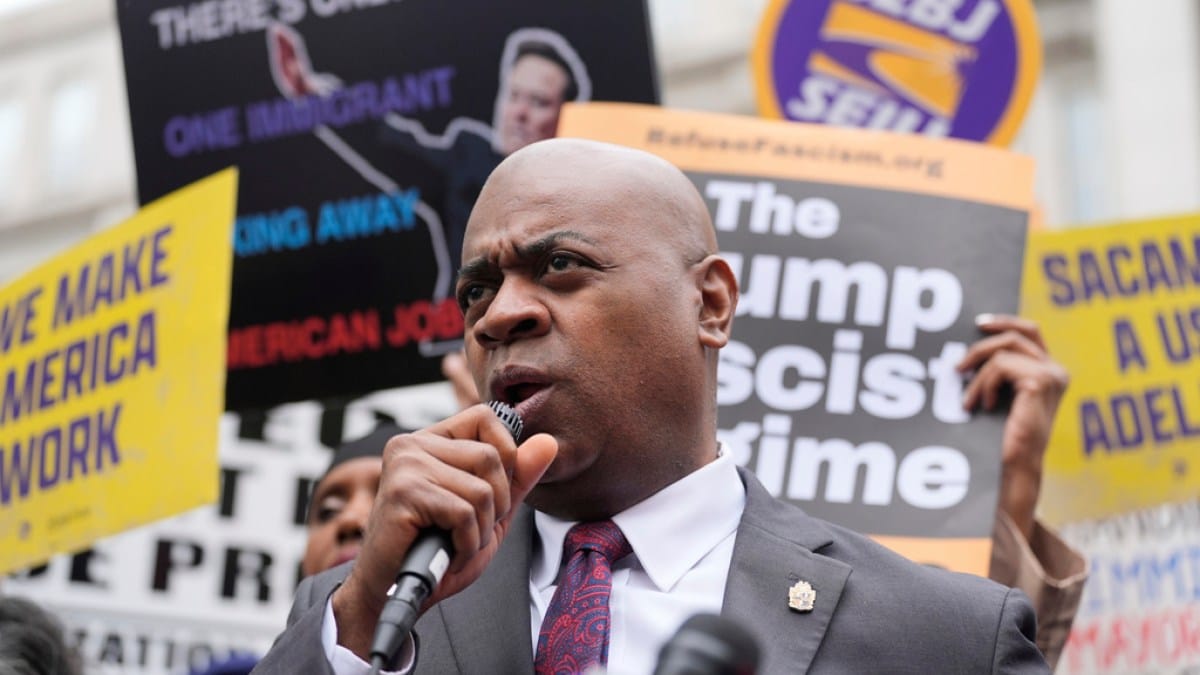Elderly man builds tree house to protest eviction from state-owned home
Before the sun rose Tuesday, Benito Flores fortified the front door of his one-bedroom duplex on a narrow street in El Sereno.
Flores, a 70-year-old retired welder, had illegally seized a home five years ago after its owner, the California Department of Transportation, had left it vacant. He’d been allowed to stay for a few months, then was directed to this nearby home owned by the agency, but now it was time to go.
Later in the morning, deputies with the Los Angeles County Sheriff’s Department were scheduled to lock him out.
Flores clearly had other plans. Over months, he’d sawed wooden two-by-fours to use as a brace between the front door and an interior wall to make it harder to breach. He bolted shut the metal screen door. Once Flores was satisfied he’d secured the entrance Tuesday, he retreated to a wooden structure he built 28 feet high in an ash tree in the backyard.
If the police wanted him to leave, they’d have to come get him in his tree house.
“I plan to resist as long as I can,” Flores said.
The homemade structure, 6 feet tall and 3 feet wide, represents the last stand for Flores and a larger protest that captured national attention in March 2020. Flores and a dozen others occupied empty homes owned by Caltrans, acquired by the hundreds a half-century ago for a freeway expansion that never happened. They said they wanted to call attention to the homelessness crisis in Los Angeles.
The issue, Flores said, remains no less urgent today. Political leaders, he argued, have failed to provide housing for all who need it.
“They don’t care about the people,” Flores said. “Who is supposed to give permanent housing to elders, disabled and families with children? It is the city and the state. And they are evicting me.”
For the public agencies involved, the resistance represents an intransigence that belies the assistance and leniency they’ve offered to Flores and fellow protesters who call their group “Reclaiming Our Homes.” The state allowed group members, or Reclaimers, to remain legally and paying rents far below market rates for two years. Since then, the agencies have continued to offer referrals for permanent housing and financial settlements of up to $20,000 if group members left voluntarily.
Evictions, they’ve said, were a last resort and required by law.
“We don’t have any authority to operate outside of that,” said Tina Booth, director of asset management for the Housing Authority of the City of Los Angeles, which is operating the housing program on Caltrans’ behalf.
Four Reclaimers, including Flores, remain in the homes.
Two have accepted settlements and are expected to leave within weeks. The final Reclaimer also has a court-ordered eviction against him, but plans to leave without incident.
Caltrans wants to sell Flores’ home and the other empty houses in El Sereno to public or nonprofit housing providers, which would make them available to low-income residents for rent or purchase.
Flores said evicting him makes no sense because the property is intended to be used as affordable housing that he qualifies for. Flores, who suffers from diabetes, collects about $1,200 a month in Social Security and supplemental payments. If he’s removed, Flores said, he has no other option except to sleep in his van — where he lived for 14 years before the home seizure.
“We are going to live on the streets for the rest of our lives,” Flores said of he and others evicted in the protest group in an open letter he sent to Sheriff Robert Luna last week.
Flores received advance notice of the lockout. His supporters began arriving at 6 a.m. Tuesday to fill the normally sleepy block. Flores already was up in the tree.
Within 90 minutes, more than two dozen people had arrived. They stationed lookouts on the corners. Some went inside Flores’ house through a side door to provide another layer of defense.
1. Los Angeles County Sheriff’s deputies speak over a fence to Benito Flores on Shelley Street in El Sereno, CA on Tuesday, June 3, 2025. 2. Benito Flores speaks with the media on Tuesday, June 3, 2025 saying that the sheriff’s department that will serve him with eviction lack compassion and that him living on the street will mean facing death.
Gina Viola, an activist and former mayoral candidate, rallied the crowd on the sidewalk. It was “despicable,” she said, to leave homes empty when so many were in need. She said those in power needed to act, just as Flores and the Reclaimers have, to provide permanent housing immediately.
“This is part of a reckoning that is long overdue,” Viola said.
She pointed to the tree house, praising Flores.
“He’s a 70-year-old elder who has climbed … into the sky to make this point to the world: ‘This is my home and I won’t leave it.’”
The structure has been visible from the street for weeks. Flores had attached a sign to the front with a message calling for a citywide rent strike.
The tree house is elaborate. Flores used galvanized steel braces to attach a series of ladders to the ash tree’s trunk. Where the trunk narrowed higher in the tree, Flores bolted spikes into the bark to make the final few steps into the structure.
Inside the tree house and hanging on nearby branches were blankets, warm clothing, food, water and his medication. To keep things clean, there’s a wooden broom he can sweep out leaves and other detritus. Flores expected to charge his phone via an extension cord connected to electricity in the garage. He bolted a chair to the bottom of the tree house and has a safety belt to catch him should he fall.
Deputies had not yet arrived by 9 a.m. Flores descended, wearing a harness, to speak with members of the news media from his driveway. He spoke from behind a locked fence.
Flores rejected the assertion that the Housing Authority has provided him with another place to live. He said the agency’s offers of assistance, such as Section 8 vouchers, aren’t guarantees. He cited the struggles that voucher holders face when finding landlords to accept the subsidies.
“They offered me potential permanent housing,” Flores said of the Housing Authority.
Jenny Scanlin, the agency’s chief strategic development officer, said that Flores was offered more than two dozen referrals to other homes, but that he rejected them. Some involved waiting lists and vouchers, but others had occupancy immediately available, she said.
“We absolutely believe he would have had an alternative place to live — permanent affordable housing” — had Flores accepted the assistance, Scanlin said.
Joseph De La O, 62, seized a Caltrans-owned home in 2020. He accepted a settlement from HACLA and has since returned to homelessness. He came to Flores’ home to help protest the eviction.”
As Flores held court in the driveway, he rolled up a pant leg to show a sore from his diabetes and said that on the streets he’d have nowhere to refrigerate his insulin.
While Flores spoke, supporters were on edge. Representatives of the property management company milled a block away holding drills.
Around 9:45, two sheriff’s cruisers parked a block away. Three deputies got out and met the property managers, then walked to Flores’ home.
Flores’ supporters met them at the driveway. The deputies said they wanted to talk to Flores and brushed past to the locked gate. Flores told them to ask themselves why they needed to evict a senior citizen. The deputies responded that they had offered assistance from adult protective services and were following orders from the court.
A deputy handed Flores a pamphlet describing housing resources the county offered, including information about calling 211. Flores held up the paper above his head to show everyone. The crowd started booing and yelling “Shame.”
An officer then tried to reason with Flores in Spanish. But it was clear things were going nowhere.
“Suerte,” the officer said to Flores. “Good luck.”
Then they left.
The Sheriff’s Department could not immediately be reached for comment, and a Caltrans spokesperson referred comment to the Housing Authority. Scanlin said she expected the lockout process would continue per the court’s order.
Flores and his supporters believe sheriff’s deputies could return at any time. Some are planning to camp out at his house overnight.













